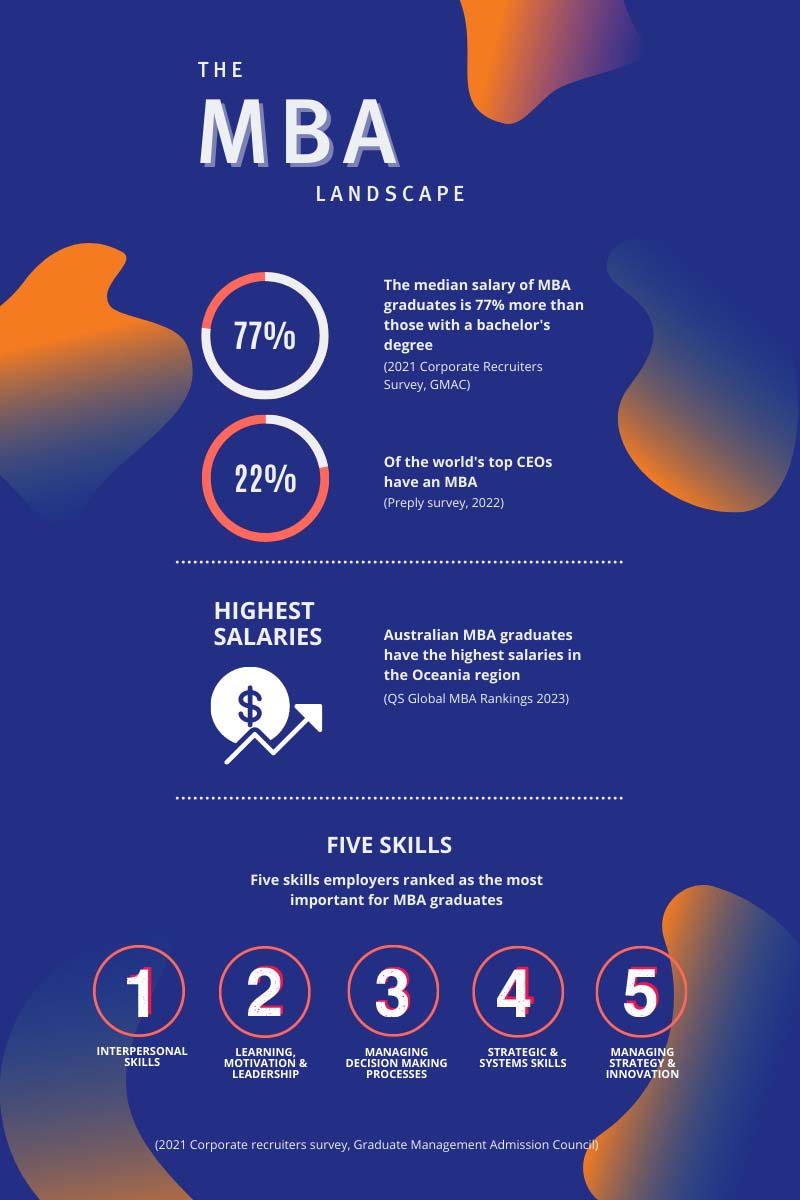> HIGHER SALARY POTENTIAL
> MANAGEMENT AND LEADERSHIP SKILLS
> CAREER CHANGE
> GAIN ENTREPRENEURIAL SKILLS TO START OR GROW YOUR BUSINESS
> NETWORKING
> PERSONAL DEVELOPMENT
> WELL-REGARDED QUALIFICATIONS ALL AROUND THE WORLD
Your choice to pursue an MBA degree will be determined by various factors including your current position and where you want your career to go in the future, how much time you can apply to study, along with your desired expectations in terms of industry and experience.
The Master of Business Administration (MBA) is widely regarded as the preferred qualification for professionals wanting to pursue a career in strategic management. Earning an MBA will provide you with the expertise, skills, and ethical standards needed to navigate and succeed in the world of business. You’ll be able to execute a variety of business management strategies aimed at creating an ideal, incentivised, and productive workplace. throughout a variety of roles and sectors (depending on your personal preferences and educational background, of course).
An MBA is an investment in the next step of your career progression. It can add value in terms of employability, earning potential and the practical and theoretical insights you gain into what it takes to make small and large business environments flourish.

Although it can vary from institution to institution, a full-time MBA degree will generally span over six trimesters, or (on average) two years. Within this same time framework, you can choose to complete a general MBA, an MBA specialisation or an MBA dual specialisation. An accelerated study option is sometimes available depending on subject offerings.
This will vary from institution to institution. At Kaplan Business School, an Australian bachelor’s degree is required for admission into an MBA, although school results, TAFE or VET qualifications, work experience and informal study will also be taken into consideration.
For international students, an Australian bachelor’s degree or equivalent is required. Students will need to have their overseas qualification assessed by the Department of Education and Training and considered equal to the postgraduate entry requirements.
International students will also have to meet English language requirements. You can read more about the specifics here. For students who don’t quite meet the level of English proficiency required, there is an option to study an English for Academic Purposes course.
The cost of undertaking an MBA will, of course, vary based on your chosen institution. According to MBA News, the average cost of an MBA in Australia (based on 100 MBA courses across the country) is just above $57,000. For international students, the average cost is over $67,000.
As such, it’s always best to consult with a facilitator to find the course best suited to where you want to study in Australia, what you’re looking for in a business school or university, and your desired learning outcomes.
For more information about the costs of studying for an MBA at Kaplan Business School, please refer to our Fees & Entry Requirements.
MBA (General)
What you’ll learn:
Best suited for:
MBA (Specialisation)
What you’ll learn:
Best suited for:
MBA (Dual specialisation)
What you’ll learn:
Best suited for:
Most institutions also offer an MBA in a variety of delivery modes to suit your needs and lifestyle:
Full time
Benefit:
Best suited for:
Part-time
Benefit:
Best suited for:
Online
Benefit:
Best suited for:
You may be asking yourself: is an MBA degree right for me? What impact will it have on my career? The MBA is an investment in your career and whether it’s right for you will depend on your individual goals. Here are some of the top reasons graduates and working professionals choose to pursue an MBA in Australia:
> HIGHER SALARY POTENTIAL
> MANAGEMENT AND LEADERSHIP SKILLS
> CAREER CHANGE
> GAIN ENTREPRENEURIAL SKILLS TO START OR GROW YOUR BUSINESS
> NETWORKING
> PERSONAL DEVELOPMENT
> WELL-REGARDED QUALIFICATIONS ALL AROUND THE WORLD

Here are some of the main reasons why MBA students choose to study in Australia:
*UN’s Human Development Report, 2022
†For more information please visit Homeaffairs.gov.au
It’s not just about handing in assessments. You can get the most out of your MBA by:
An MBA degree is a serious commitment. To get the most out of your experience and maintain a healthy and fulfilled lifestyle, time management will be an essential skill to master.
For a full-time MBA, you are looking at a time commitment of around 34 hours a week, including class attendance and self-study. You will need to learn to manage assignment deadlines, full-time/part-time work, family and friends, as well as allow time to relax and recharge.
Some top tips to help manage the study/work/life balance include: